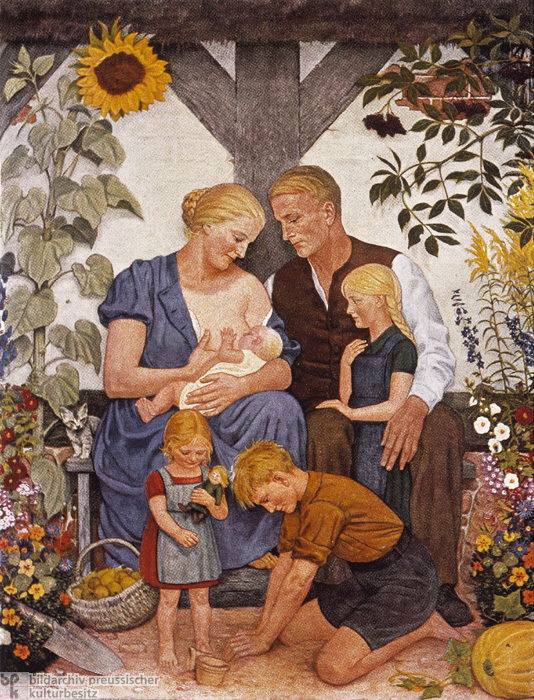|
The Aryan Family (c. 1938-1939)
Like many of their socially conservative contemporaries, the National Socialists regarded the social and economic changes that had occurred after the First World War as a source of social corruption. Falling birth rates, rising divorce rates, later marriages, and growing numbers of working women – all this was seen as symptomatic of a sick society. Therefore, the Nazi regime promoted a return to patriarchal values and gender roles, presenting these changes as their ostensible justification. Early marriage and large families were praised as the ideal. According to National Socialist thought, women were to make home and children their central concern, whereas men were supposed to earn enough to support them. In reality, however, the Nazis were less concerned with restoring the traditional social order than with giving the family a central place in the regime's military and racist worldview. Early marriage and high birthrates were supposed to maintain the competitiveness of the German people in the ongoing battle with "inferior" races. In other words, the image of the family as the "nucleus of the nation" served chiefly to ensure that future generations of soldiers would be conceived, born, and raised. The Aryan Family (undated) is a print after a painting by Wolfgang Willrich. It depicts what could be described as the quintessential Aryan family. With their sunshine-blond hair, strong jaw lines, chiseled “Nordic” features, and rosy-red cheeks, the members of this family of six could have easily appeared as “Aryan” ideals in the Nazi propaganda series “Blood and Soil.” The clothing of the boy in the foreground seems to identify him as a member of the Hitler Youth, while the traditional rustic clothing of the others links them to the rural population so idealized by the regime. Symbols of hard work, fertility, bounty, health and vitality, and connection to the land abound. The family’s home, a half-timbered, thatched-roof construction, is an excellent example of the völkisch architecture celebrated by the Nazis, and, as such, provides a fitting backdrop for this idyllic family scene.

|


